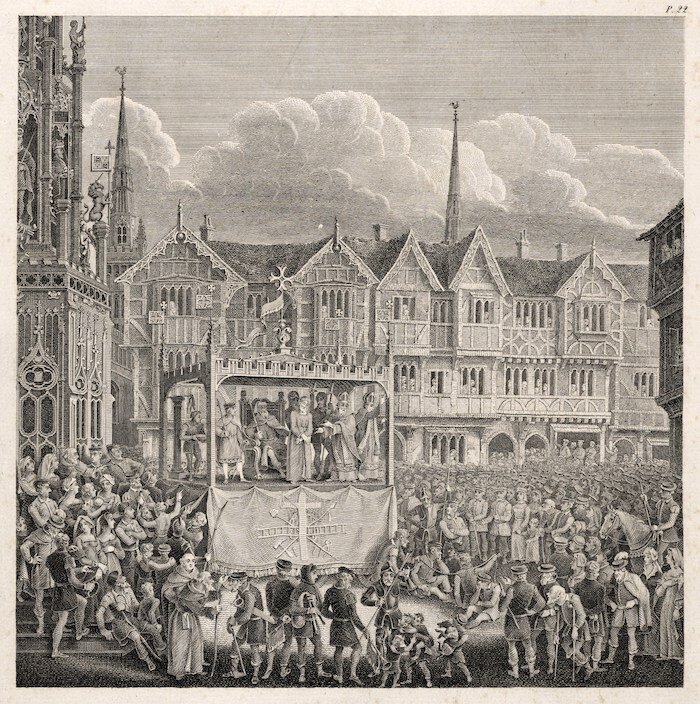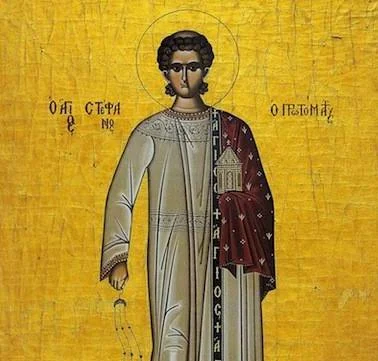Fr Michael Farthing died on the 28th of December 2019, having served as a priest for mover than sixty years. This is a sermon preached at this requiem mass at St Mary Magdalen’s Oxford by Fr Peter Groves.
All in essay
Science and Religion series — “The Galileo Affair, Part 2: Galileo”
Here’s a story often told: Sometime in the 17th century, Galileo taught that the Earth revolved around the Sun, which is obviously true. Refusing to believe him because it made them feel cosmically insignificant, the Church authorities tried to silence him. They even refused to look through his telescope when he offered it to them to see for themselves. Ultimately, they banned his books and sentenced him to imprisonment.
Science and Religion series -- "The Galileo Affair, Part 1: Copernicus"
Obviously, the Earth revolves around the Sun. This is obvious now in part because we—maybe not me or you, but someone—can go to space, and see it happening. The trouble is that is was not at all obvious in 1543. Nicolaus Copernicus died in 1543: he lived just long enough to see the publication of his magnum opus, On the Revolutions of the Heavenly Spheres. It is said that he held a copy of it on his death bed.
Christian symbolism: Blue
Next on our series on Christian symbolism, Mthr Melanie Clark writes on the history and significance of the Church’s use of the colour blue. Mthr Melanie is Curate of Lichfield S Michael with S Mary and Wall S John. She is an early modern historian: her PhD thesis (Selwyn College, Cambridge) was on the English Civil Wars and Restoration period in the seventeenth century.
Christian Symbolism: The Book
If it takes an imaginative leap to see the book, understood as an artefact or object, as a sign or symbol in Christian life, then this is perhaps down to sheer familiarity. Books are ubiquitous in Western culture. I sit writing this in one of my favourite places: an enormous bookshop in rural Warwickshire, consisting of multiple barns full of volumes on every imaginable topic. Even in the café I am surrounded by stacks of the things, I am resting my laptop on a few of my most treasured discoveries (books are working objects, after all).
Hymns and Carols: Coventry Carol
This is a series on Advents and Christmas carols, but today we are looking at a carol that was originally written as a song to be performed as part of the celebrations of the summertime feast of Corpus Christi. In the medieval period in England, dramatic presentations of salvation history—usually spanning all time from Creation to Doomsda—were a major part of the way in which Corpus Christi was celebrated in many towns and cities.
Hymns and Carols: Creator of the Stars of Night
Watching is so difficult. It can feel incredibly self-conscious, awkward, indulgent, or even just plain boring. Yet watching is what we are called to do in Advent as we await the coming of the Lord in our midst. ‘When these things begin to take place, stand up and lift up your heads, because your redemption is drawing near,’ (Luke 21.28) is the gospel injunction, as greeting the apocalypse should be done fearlessly in faith.
Hymns and Carols: Gabriel's Message
The medieval Basque hymn ‘Gabriel’s Message’ tells the story of the Annunciation in the context of Christmas. The worship of heaven and earth conjoin as the chorus repeats the connection between the Blessed Virgin Mary’s unique status as the Mother of God and the desire to honour and praise both her and God.
Why should Christians care about the general election?
Two cities. Two kingdoms. Two nations. Christian theology—and political theology in particular—is littered with these binaries. An election is approaching imminently in the United Kingdom, and in the near future in the United States.
Advent: Season of Liberation
Advent suffers from a crisis of identity: is it a period of preparation for Christmas, or a period in which we think about Christ’s second coming ‘to judge the living and the dead’? Originally, it seems to have been neither.
Why should Christians care about industrial action?
As I am writing this, universities across the United Kingdom are participating in industrial action—including strikes—over a variety of disputes: pension contributions are being cut, pay over the last decade has decreased by about 17% relative to inflation, women and people of colour are paid less than White males (by 9-15%), workloads are increasing, staff are being evaluated in reductive ways, and work contracts are becoming more “casual”, which makes employment more precarious, especially for junior staff, women, and people of colour.
Why should Christians care about reparations?: Black Bodies and the Justice of God
The Church is one of the world’s fiercest, most unrepentant and historically ignorant bastions of white supremacy. British Christianity in particular has played a central part in the violence against black bodies over the centuries by colluding with the powers of evil primarily in the form of the British Empire: in the words of historian James Walvin, the history of the Church has been a history of “God fearing men going about their godless business”
The ‘Difficult Adventure’: Michael Ramsey’s Church Catholic & Beyond
Michael Ramsey is an unusual figure. A convert to Anglicanism from a non-conformist background, he displays an unusual lack of the “zeal of the convert”. Instead, throughout his writing and ministry, he points toward a vision of the Church which offers a glimpse of a Church which might be more united and more truly catholic than any of our earthly expressions of such catholicity.
Why should Christians care about tax?
We often hear that we should pay our taxes because Jesus told us to. Give to God that which is God, and to Caesar that which is Caesar’s. Say your prayers and pay your taxes. Such a theology of taxation and loyalty to government has been used by some states to encourage Christians to quiet compliance.
Discerning vocation to the distinctive diaconate
There are two scenarios regularly experienced by distinctive deacons. First, a priest helps put some chairs away or does a bit of washing up, and with a smile says, “once a deacon, always a deacon”. Second, a deacon will be asked “when are you going on to full ordination?”. Both scenarios distort the nature of the diaconate and demonstrate the rather negative and limited understanding in the Church of England about this ancient order of ministry.
Why should Christians care about nonviolent direct (climate) action?
For too long, being green and caring about the environment has been seen as a special interest group in the church—for the cyclists, allotment holders, and mother earth types. Lip service has been paid to the fact that God is creator, “all things come from thee, and of thy own have we given thee”, and that we and all that we see, touch, hear, smell and taste is created or God-breathed. And yet we are part of creation—trees clap their hands (Isaiah 55:12); God is intrinsically involved in the natural world; and promises never again to “curse the ground” and destroy “every living creature” after the flood.
Discerning vocation to religious life
I have recently been asked to articulate what the difference is between a committed Christian life and the religious life, in the sense of life as a member of a religious community. Clearly religious life is not for all Christians, so what is the distinction? It sounds like a simple question, but actually it is one I have been asking myself for at least the last 35 years and failed to come up with a convincing answer! […]
Guest post: Which Old Testament?
I was recently looking for an audio Bible app for my phone and came across a review of one particular app which declared, rather fiercely, that ‘This version can send you to hell’. The reviewer objected that: ‘KJV Jesus says we must be “converted” and this ESV says “forgiven”. This is huge. Converted and forgiven are two different words. Being born again and forgiven is not even close. This doesn’t save NO ONE. Garbage.’
St Mary Magdalen: Apostle to the Apostles
Today—July 22—is the feast of St Mary Magdalen, our saintly patron. We have her in mind often, when we are putting material together for this site and for our books. Regular readers probably skip the front page of the website now, but it is a good time to revisit something Rowan Williams said to us when we launched the School of Theology […]
Theologising the Fear of Death, Pt 2
There is another obvious explanation for the findings we previously considered, which suggest that people do not really fear death. But this strategy risks being a question-begging one: that is that the fear of death is, in most people for most of the time—and perhaps most of all as death is nigh—sublimated or suppressed in some way.



















